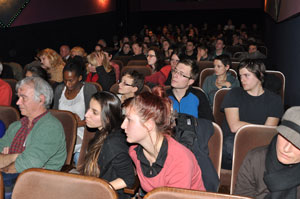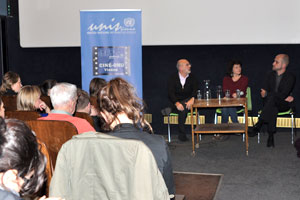

Most victims of modern armed conflict are women and children according to the initiative UN Action Against Sexual Violence in Conflict. Women in particular can face devastating forms of sexual violence, which are often deployed systematically to destroy whole communities.
On the occasion of Human Rights Day (10 December), the United Nations Information Service (UNIS) Vienna, in cooperation with this human world (THW) Film Festival and Topkino , screened the documentary "Carte Blanche" by Heidi Specogna.
The film shows investigators of the International Criminal Court (ICC) at work in The Hague and in the Central African Republic, collecting evidence in the case of Jean-Pierre Bemba Gombo, who has been charged with rape, torture and murder as crimes against humanity.
The title of the documentary Carte blanche refers to a so-called "signal" that commanders often use to give unrecordable orders to their troops which can easily be denied afterwards.
The director uses strong pictures and a very graphic description of the victims. One part of the film shows a mother cleaning her young daughter's unhealed bullet wound with herbal water, whilst the girl herself is screaming at the top of her voice. The bullet wound is a souvenir of the time when Bemba's troops overran the girl's village in 2002.
Another scene shows the cruel fate of a family which is still suffering from the 2002 incidents. "We have not found peace again ever since" tells the mother of three daughters who were publically raped by Bemba's troops and therefore ruined the family's reputation. The eldest daughter's fiancé left her immediately afterwards and decided to marry somebody else. The youngest daughter dreams of a life far away, where no one knows about her history.
The subsequent panel discussion focused on the ICC's efficiency and featured Co-Author Sonja Heizmann, Crime Prevention and Criminal Justice Officer Philipp Meissner from the United Nations Office on Drugs and Crime (UNODC) and UNIS Vienna Director Janos Tisovszky as moderator.
Critical voices lamented the Court's very tedious and lengthy processes with high costs and a low track record with only one conviction so far. A former UN staff member who was sitting in the audience deplored the fact that only the commanders are being put on trial and the foot soldiers, the real perpetrators, are usually granted amnesty. Referring to the Sierra Leone case she made the point that today many former Sierra Leonean human rights violators are taxi drivers and still pose a serious threat to society.
Philipp Meissner underlined that we should not forget that the ICC is still a young institution which needs time to establish itself.
For further information visit the Ciné-ONU page.